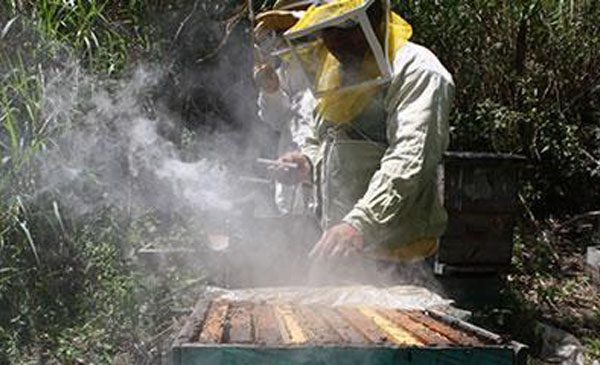
In the early years of working in beekeeping, things were better. The climate was better because I was able to harvest more honey with less beehives. In 2005 I managed to produce 12 barrels of honey with 50 beehives. Now, this year – in the years after 2005 – climate change has begun to cause us difficulties because the harvest size has been falling. This year has maybe turned out to cause us the most difficulties. At the moment I have 70 beehives and I haven’t produced more than five barrels of honey.
Excessive rains, which we expect to come in a certain season, suddenly appear in other seasons. The rains come suddenly in the dry season and we can’t harvest the honey.
Now, our economic resources have definitely decreased. We’ve managed beekeeping with the utmost care that beekeeping requires, we’ve been changing the queen bees to improve the hives and to harvest more, but we haven’t been able to achieve this. What I have, I have thanks to the bees
Sometimes, I ask myself if I’ll give up beekeeping, as the cost of beekeeping is high. During the period of scarcity, the rainy season, you have to buy lots of sugar to feed the bees as there’s no longer enough nectar. You have to buy lots of products and medicines for the plagues and diseases in the beehive, and this also causes us lots of problems. On top of this, there’s the expense I have in putting my children through school. My daughter’s studying at high school. But I’m going to persevere with the bees because what I have, I have thanks to them.
In fact, my son, who is 16, has made his own decision. He already has his own beehives and he says that he’s going to have his own apiary, so that he can have his own swarms as well.
At the moment I’m sowing guava trees and other flowering trees that help me a lot, in order to have higher bee production. We’ve been studying flowering plants and we are investigating if there’s a flowering plant that gets through the period of scarcity. We’re going to request training on plants that flower during this period as this would help us a lot in order to reduce the bee’s artificial food, which is sugar. Having more flowering plants during the rainy season, we would spend less on artificial foods such as sugar.
German Garcia Lara is a bee-keeper and carpenter living in Honduras.